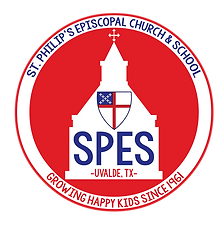PROGRAM DESCRIPTION
St. Philip's Episcopal School provides an integrated course schedule of learning through exploration, scrutiny, and self-reflection. In every class, our teachers emphasize the strategies and processes involved in learning and self-growth, creating a unique opportunity to prepare our students to live thoughtful, creative, and fulfilling lives in a rapidly changing society. Please see our current course offerings below.
Preschool
It is the belief at St. Philip’s Episcopal School that for 2's and 3's, vital learning takes place through play. We emphasize developing concepts such as gross and fine motor skills, visual memory, classification, spatial relations, alphabet recognition, listening and speaking, and learning to get along with others.
Our Preschool, which consists of our 2K, 3K, and PreK, uses Creative Curriculum by Teaching Strategies. The Creative Curriculum for Preschool is a comprehensive, research-based curriculum that features hands-on investigations. This top-rated, award-winning curriculum is designed to harness the power of play, nurture the whole-child and individual skill progression, seamlessly connect families to their children’s learning, and support teachers every step of the way. Creative Curriculum is the most widely used preschool curriculum in the country.
Our 2K curriculum helps every young learner thrive. The program builds on daily routines and creates meaningful learning experiences with a comprehensive, research-based curriculum that nurtures the unique strengths, interests, and needs of children 24-36 months in age.
-
Hilda Barboza is our 2K teacher, and her assistant is Arianna Reyes.
Our 3K curriculum empowers children to be confident, creative, and caring learners through play-based, hands-on investigations—a research-based approach that incorporates language, literacy, and mathematics throughout the day.
-
Clarissa Ramos is the director for our Preschool Program and teaches the 3's. Sarahy Escobar and Chelsy Moreno are her assistants.
Our Pre-Kindergarten curriculum fosters joyful classrooms while preparing children for kindergarten. It is designed to support child development and respects how children learn best—through play. The program incorporates the Science of Reading, utilizes the Creative Curriculum for Pre-K by Teaching Strategies, and aligns with the Texas Pre-Kindergarten Guidelines. Learning is facilitated through engaging learning centers.
-
Lynn Cantu teaches pre-kindergarten, and Silvia Galarza is her assistant.
Kindergarten
Kindergarten emphasizes reading readiness, beginning phonics, simple science, music, art, writing, and number concepts. Activities in which eye and hand coordination is developed are taught, as well as body awareness and the continuing development of gross and fine motor skills.
-
Lisa Ayala is our Kindergarten teacher.
Kindergarten Curriculum Overview
Reading: Journeys Houghton Mifflin
Phonics: Tara West Phonics
Writing: Write Source
Math: Tara West Math
Science: Inquisitive - a phenomena-based science curriculum
Social Studies: Ben Carson’s Little Patriots
First Grade
Our expectations for first grade exceed the minimum requirements of the Texas State Board of Education. A well-balanced curriculum is offered that includes reading, language arts, mathematics, science, social studies, physical education and health, Spanish, music, Christian education, technology, and art.
-
Nora Pollard is our first grade teacher
First Grade Curriculum Overview
Reading: Journeys Houghton Mifflin
Phonics: Tara West Phonics
Writing: Write Source
Math: Tara West Math
Science: Inquisitive - a phenomena-based science curriculum
Social Studies: Ben Carson’s Little Patriots
Second Grade and Third Grade
Our expectations for second and third grade exceed the minimum requirements of the Texas State Board of Education. A well-balanced curriculum is offered that includes reading, language arts, mathematics, science, social studies, physical education and health, Spanish, music, Christian education, technology, and art.
Second and Third Grade Curriculum Overview
Reading: Journeys Houghton Mifflin
Phonics: Tara West Phonics
Writing: Write Source
Math: Tara West Math
Science: Inquisitive - a phenomena-based science curriculum
Social Studies: Ben Carson’s Little Patriots
Fourth Grade and Fifth Grade
Our expectations for fourth and fifth grade exceed the minimum requirements of the Texas State Board of Education. A well-balanced curriculum is offered that includes reading, language arts, mathematics, science, social studies, physical education and health, Spanish, music, Christian education, technology, and art.
Fourth and Fifth Grade Curriculum Overview
Reading: Journeys Houghton Mifflin
Phonics: Tara West Phonics
Writing: Write Source
Math: Tara West Math
Science: Inquisitive - a phenomena-based science curriculum
Social Studies: Ben Carson’s Little Patriots





